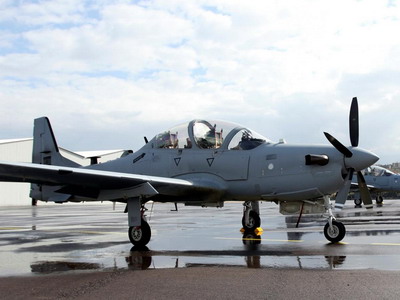Nigeria to Receive Super Tucanos from the United States
The United States Department of Defence has placed a $329 million contract with the Sierra Nevada Corporation to manufacture 12 A-29 Super Tucano aircraft for the Nigerian Air Force (NAF).
The contract was announced on 28 November and is worth $329 076 750 for the aircraft, although the total not-to-exceed amount is approved at $344 727 439 and is to include Forward Looking Infrared (FLIR) systems for six of the aircraft. These systems will be funded soon after the initial contract award.
In addition to the 12 aircraft, the contract provides for ground training equipment, mission planning systems, mission debrief systems, spares, ground support equipment and support services.
The Department of Defence said that work will be performed in Jacksonville, Florida, and is expected to be completed in May 2024.

The Nigerian Air Force in December 2017 received letters of offer and acceptance for the Super Tucano deal. In August last year the Nigerian deal was valued at $593 million and included Paveway II guided bombs, laser-guided rockets, 12.7 mm ammunition, unguided bombs and infrared sensors. Some of this may be acquired under separate contracts.
Based on an earlier request, it can be assumed that Nigeria will be getting AN/AAQ-22F electro-optical/infrared (EO/IR) sensor and laser designator turrets.
The sale of the aircraft has been dogged by controversy. Under Barack Obama, the former U.S. president, the deal had been held off due to concerns about the Nigerian military’s human rights abuses. In one instance, up to 170 people died in January 2017 after the NAF bombed a refugee camp in the northeastern town of Rann. But President Donald Trump’s administration approved the sale to support Nigeria’s efforts to fight Boko Haram militants and to boost US defence jobs.
However, the deal nearly stalled earlier this year when the Nigerian defence ministry complained over the late delivery date of the aircraft and the fact that Nigerian personnel were to be excluded from the aircraft’s production and maintenance processes. Defence Minister Mansur Dan Ali in January refused to accept these conditions.
Published by defenceWeb, Thursday, 29 November 2018

